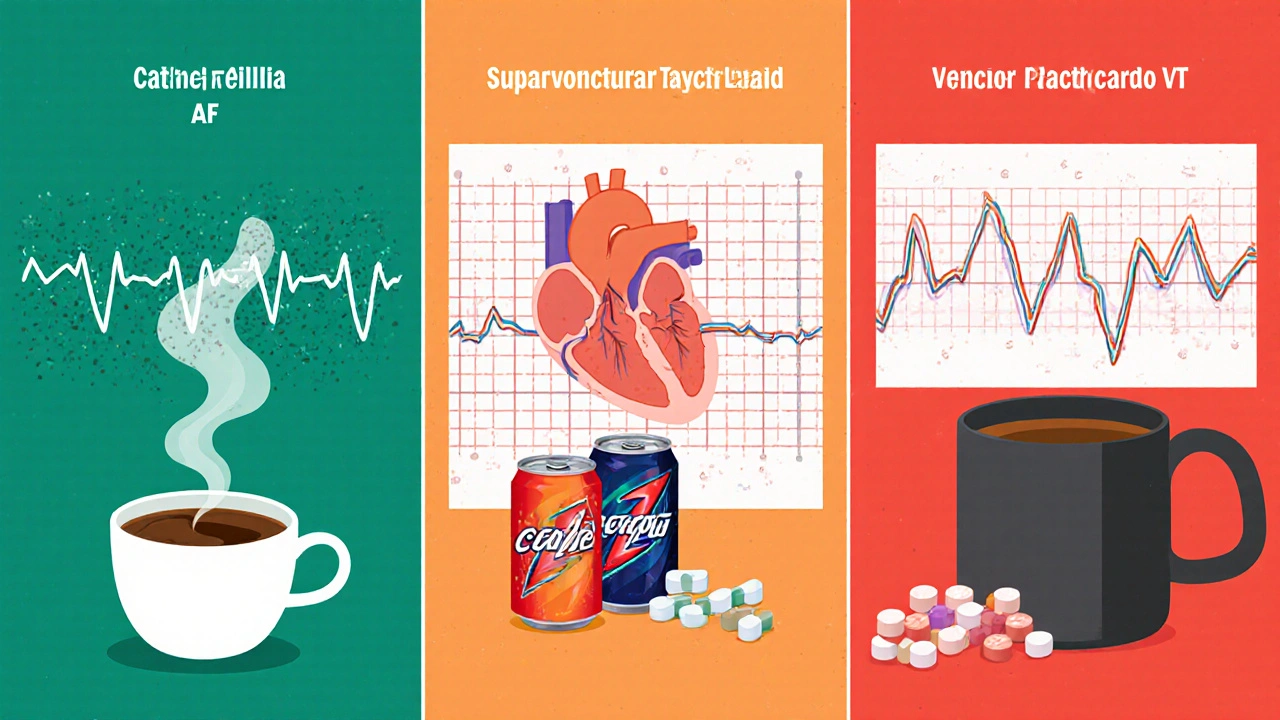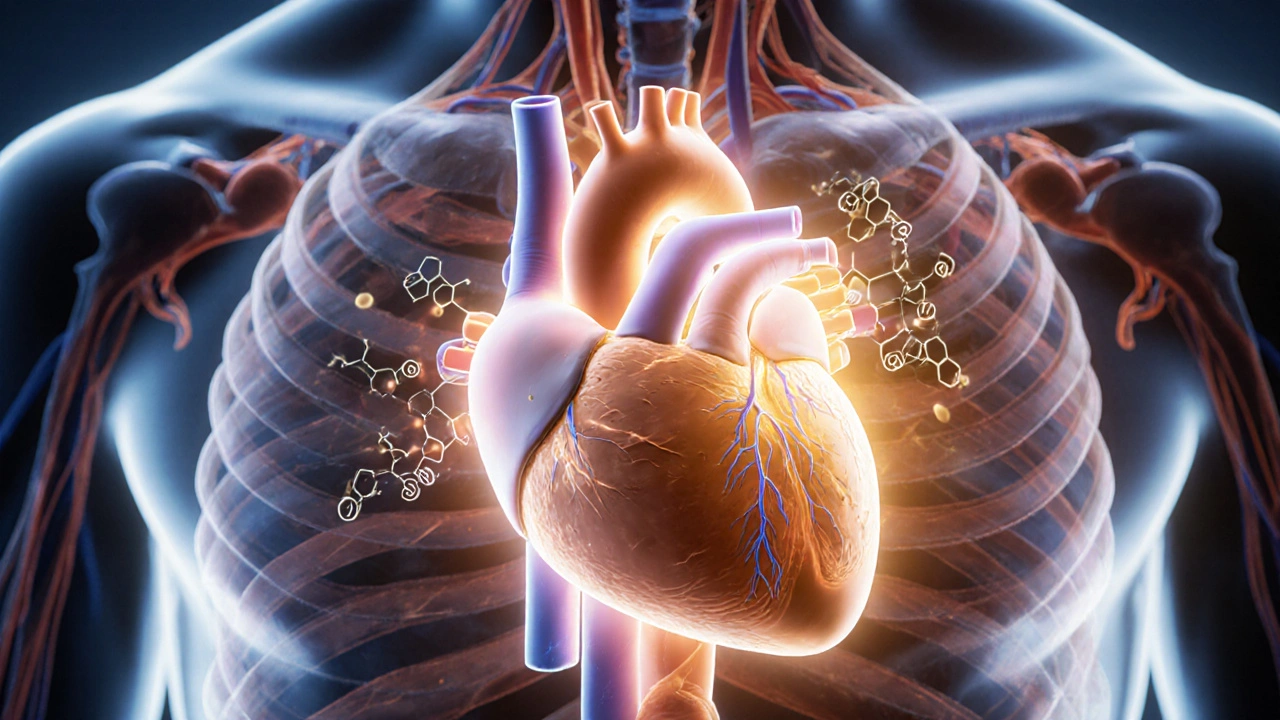Caffeine Intake Calculator for Arrhythmia Patients
Caffeine Intake Calculator
Estimate your daily caffeine intake and see how it relates to heart rhythm disorder risks.
Your Caffeine Sources
Recommended Limits
- Low risk: Up to 200 mg/day
- Moderate risk: 200-300 mg/day
- High risk: > 300 mg/day
Many clinicians recommend limiting intake to 100-200 mg/day to minimize arrhythmia triggers.
- Consuming > 400 mg/day
- Experiencing palpitations or other symptoms
- On anti-arrhythmic medication
Your Caffeine Intake Summary
Total daily intake: mg
Risk level:
Recommended limit for arrhythmia patients: 100-200 mg/day
When it comes to daily drinks, Caffeine is a central nervous system stimulant found in coffee, tea, soda, and energy drinks that many enjoy without a second thought. However, for people dealing with heart rhythm disorders irregularities in the heart’s electrical activity that can lead to palpitations, fainting, or even stroke, that habit can have real consequences. This article breaks down the science, highlights the most relevant clinical findings, and offers practical steps to keep your caffeine habit in check.
What happens inside the body when you sip caffeine?
Caffeine works by blocking adenosine receptors protein sites that normally calm the brain and heart. With adenosine inhibited, the sympathetic nervous system the branch of the nervous system that triggers the ‘fight‑or‑flight’ response ramps up, releasing norepinephrine and increasing heart rate and contractility. Blood pressure often rises a few points as well, especially after larger doses. The net effect is a faster, more excitable heart, which can tip a borderline rhythm into an outright arrhythmia.
Which heart rhythm disorders are most sensitive to caffeine?
Not all arrhythmias behave the same way. The three most studied in relation to caffeine are:
- Atrial Fibrillation (AF) an irregular, often rapid heart rhythm originating in the atria, the most common sustained arrhythmia in adults.
- Supraventricular Tachycardia (SVT) a fast rhythm that starts above the heart’s ventricles, usually sudden but brief.
- Ventricular Tachycardia (VT) a potentially dangerous rapid rhythm arising from the ventricles, which can deteriorate into cardiac arrest.
Because AF often involves a delicate balance of electrical triggers and structural changes, researchers pay close attention to any substance that can increase atrial excitability, caffeine included. SVT, being highly responsive to catecholamines, is also known to flare after a strong caffeine hit. VT is less directly linked but some case reports note that extreme caffeine overdoses may precipitate it in vulnerable hearts.

What does the research say?
Large‑scale epidemiological studies provide the most reliable picture. A 2023 meta‑analysis of 12 cohort studies involving over 500,000 participants found that moderate coffee consumption (1-3 cups per day, roughly 100-300mg caffeine) was associated with a caffeine and heart rhythm risk reduction of about 8% for incident AF. The protective effect seemed strongest in people who consumed coffee without added sugar and who were physically active.
In contrast, a 2024 randomized trial of 210 patients with known SVT showed that a single 200mg caffeine dose increased the number of premature atrial beats by 23% within 30minutes, as measured by continuous electrocardiogram (ECG) a test that records the heart’s electrical activity. Most episodes were short‑lived, but 12% of participants reported symptomatic palpitations.
Extreme consumption tells a different story. Case series from emergency departments across Australia and the UK in 2022 reported that individuals ingesting >600mg caffeine in a short window (typically through energy drinks or caffeine pills) presented with tachyarrhythmias, including VT, and required pharmacological cardioversion in 5% of cases.
Overall, the evidence points to a dose‑response relationship: low to moderate intake may be neutral or even protective, while high intake can provoke arrhythmias, especially in people with pre‑existing electrical instability.
How much caffeine is safe for people with rhythm disorders?
| Intake Level | Typical Sources | Plasma Caffeine (mg/L) | Observed Rhythm Effect | Guideline for Arrhythmia Patients |
|---|---|---|---|---|
| Low (<100mg) | Small cup of tea, half a cup of coffee | ~1‑2 | Minimal impact, occasional benign ectopy | Generally safe; no restriction needed |
| Moderate (100‑300mg) | 1‑2 cups of brewed coffee, 2‑3 cans of soda | 2‑5 | Potential slight increase in premature beats; may lower AF risk in active adults | Allowed for most, monitor symptoms |
| High (300‑600mg) | 3‑4 cups of coffee, 2‑3 energy drinks | 5‑10 | Increased SVT episodes, occasional symptomatic palpitations | Limit to one strong coffee per day; avoid energy drinks |
| Very High (>600mg) | 5+ cups coffee, multiple energy drinks, caffeine pills | >10 | Higher chance of sustained tachyarrhythmias, rare VT triggers | Strongly discouraged; seek medical advice if needed |
These numbers are averages; individual tolerance varies. People taking beta‑blockers, for example, may feel a stronger heart‑rate rise from a modest dose, while seasoned coffee drinkers often develop a mild tolerance.
Practical ways to manage caffeine if you have an arrhythmia
- Know your daily total. Keep a simple log for a week - note every cup of coffee, tea, soda, and even chocolate.
- Choose low‑caffeine options. Switch to half‑caff espresso, green tea (≈30mg), or herbal teas that contain no caffeine.
- Space out doses. Avoid gulping several drinks in a short period; give your body at least 3-4hours between caffeine sources.
- Watch the timing. Caffeine consumed after 2p.m. can disrupt sleep, and poor sleep is a known AF trigger.
- Stay hydrated. Dehydration raises blood viscosity, which can exacerbate rhythm issues. A glass of water with each caffeinated drink helps.
- Listen to your body. If you notice a flutter, racing heart, or dizziness after a coffee, cut back immediately and discuss with your cardiologist.
For patients already on anti‑arrhythmic medication, doctors often recommend a trial period of reduced caffeine to see if symptom burden improves. It’s a low‑risk, high‑reward adjustment.
When should you see a doctor?
Any of the following signs warrant a prompt check‑up:
- Palpitations that last more than a few minutes or occur repeatedly.
- Dizziness, light‑headedness, or fainting after caffeine consumption.
- Shortness of breath or chest discomfort accompanying a rapid heart rate.
- New‑onset AF diagnosed on an ECG electrical tracing of heart activity after a caffeine binge.
Bring a log of your caffeine intake to the appointment - it helps the clinician pinpoint patterns and tailor advice.
Bottom line for coffee lovers with rhythm issues
Moderation is key. A single cup in the morning is unlikely to harm most people with AF, SVT, or VT, and may even convey a small protective benefit. Problems arise when the habit escalates to multiple strong coffees or sugary energy drinks, especially later in the day. Knowing your personal threshold, tracking intake, and staying in touch with your healthcare provider will keep the buzz from turning into a dangerous beat.
Frequently Asked Questions
Can decaf coffee affect my heart rhythm?
Decaf contains only trace amounts of caffeine (usually <5mg per cup), which is too low to trigger a measurable change in heart rhythm for most people. However, some decaf brands use chemical solvents that might cause other reactions, so choose high‑quality water‑processed decaf if you’re sensitive.
Is green tea safe for someone with atrial fibrillation?
Green tea typically provides 20‑45mg caffeine per 8‑oz cup, placing it in the low‑moderate range. Most studies show it does not increase AF risk and may even have antioxidant benefits. Still, monitor your symptoms the first few weeks.
Do energy drinks pose a higher risk than coffee?
Yes. Energy drinks combine high caffeine levels with other stimulants (taurine, guarana) and large sugar spikes, which together amplify sympathetic activation. Their rapid absorption can push plasma caffeine above 10mg/L, a range linked to serious tachyarrhythmias in vulnerable individuals.
Should I stop caffeine completely if I’ve had a recent AF episode?
Not necessarily. Many cardiologists recommend a short trial of reduced caffeine (e.g., limiting to one 8‑oz cup per day) for a few weeks to see if symptoms improve. Complete cessation is reserved for patients who show a clear trigger‑response pattern.
How long does caffeine stay in the body?
The average half‑life of caffeine in healthy adults is about 5hours, but it can extend to 8‑10hours in older adults, pregnant women, or those taking certain medications. This means a late‑afternoon coffee can still affect you overnight.
